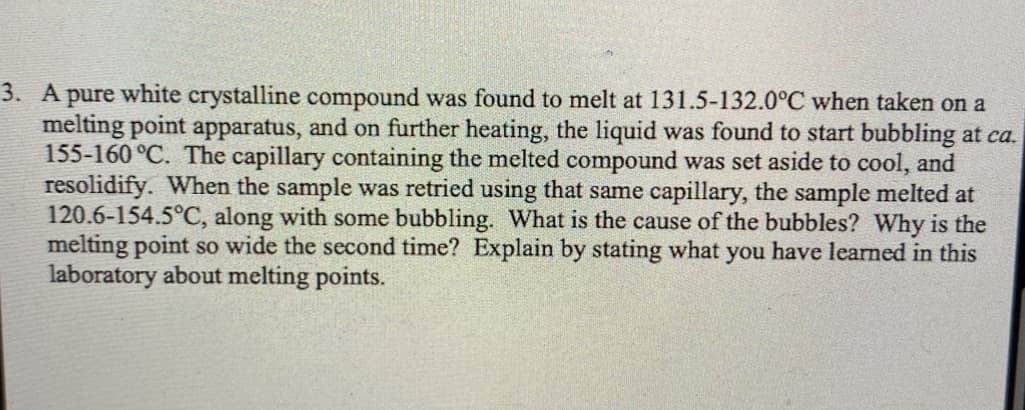A pure white crystalline compound was found to melt at 131.5-132.0°C when taken on a melting point apparatus, and on further heating, the liquid was found to start bubbling at ca 155-160 °C. The capillary containing the melted compound was set aside to cool, and resolidify. When the sample was retried using that same capillary, the sample melted at 120.6-154.5°C, along with some bubbling. What is the cause of the bubbles? Why is the melting point so wide the second time? Explain by stating what you have learned in this laboratory about melting points.
A pure white crystalline compound was found to melt at 131.5-132.0°C when taken on a melting point apparatus, and on further heating, the liquid was found to start bubbling at ca 155-160 °C. The capillary containing the melted compound was set aside to cool, and resolidify. When the sample was retried using that same capillary, the sample melted at 120.6-154.5°C, along with some bubbling. What is the cause of the bubbles? Why is the melting point so wide the second time? Explain by stating what you have learned in this laboratory about melting points.
Macroscale and Microscale Organic Experiments
7th Edition
ISBN:9781305577190
Author:Kenneth L. Williamson, Katherine M. Masters
Publisher:Kenneth L. Williamson, Katherine M. Masters
Chapter4: Recrystallization
Section: Chapter Questions
Problem 6Q
Related questions
Question

Transcribed Image Text:3. A pure white crystalline compound was found to melt at 131.5-132.0°C when taken on a
melting point apparatus, and on further heating, the liquid was found to start bubbling at ca.
155-160 °C. The capillary containing the melted compound was set aside to cool, and
resolidify. When the sample was retried using that same capillary, the sample melted at
120.6-154.5°C, along with some bubbling. What is the cause of the bubbles? Why is the
melting point so wide the second time? Explain by stating what you have learned in this
laboratory about melting points.
Expert Solution
This question has been solved!
Explore an expertly crafted, step-by-step solution for a thorough understanding of key concepts.
Step by step
Solved in 2 steps

Knowledge Booster
Learn more about
Need a deep-dive on the concept behind this application? Look no further. Learn more about this topic, chemistry and related others by exploring similar questions and additional content below.Recommended textbooks for you

Macroscale and Microscale Organic Experiments
Chemistry
ISBN:
9781305577190
Author:
Kenneth L. Williamson, Katherine M. Masters
Publisher:
Brooks Cole

Macroscale and Microscale Organic Experiments
Chemistry
ISBN:
9781305577190
Author:
Kenneth L. Williamson, Katherine M. Masters
Publisher:
Brooks Cole